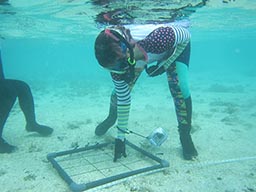- ABOUT US
- PROGRAM AREAS
- CONSERVATION APPROACH
- EDUCATION
- MULTIMEDIA
Coral reef mapping and monitoring: Scientists have mapped coral reef ecosystems in the Gulf of America (formerly Gulf of Mexico) and the Atlantica and Pacific Oceans. Habitat mapping supports the accurate collection of biological, socioeconomic, and climatic data needed to evaluate the condition of the nation’s coral reef resources over time and how people use them. Monitoring operations include the National Coral Reef Monitoring Program, an integrated and focused monitoring effort that is providing a robust picture of U.S. coral reef condition.Forecasting and modeling products: The program funds the development of early warning products on various impacts, including oceanographic conditions, coral bleaching, disease, runoff and more, such as NOAA’s Coral Reef Watch.Capacity building for conservation planning and actions: NOAA lends its expertise in developing management plans, providing trainings and workshops, and implementing best management practices that reduce land-based sources of pollution and restore related marine habitats.Social Science Program: Our Social Science Program improves coral reef management by recognizing people and society as part of the coral reef ecosystem and incorporating related data into coral reef management strategies.Financial Assistance: Each year, we strive to award at least $8 million in grants and cooperative agreements, which are matched by nonprofit organizations, academic institutions, regional fishery management councils, commercial entities, community groups, and state and territorial natural resource management agencies.Support of the U.S. Coral Reef Task Force: We play a leadership role in the U.S. Coral Reef Task Force, a body of 12 federal agencies, seven states, territories, commonwealths, and three freely associated states that oversees U.S. government partnerships and strategies to protect coral reefs.Public outreach and education: We recognize the value of an informed and engaged public, empowered to act in partnership for coral reef conservation. We use new and innovative tools to increase awareness and stewardship of coral reef resources.
Our Strategy

The NOAA Coral Reef Conservation Program delivers sound scientific information and tools that coastal and marine resource managers need to effectively address the primary threats coral reef ecosystems face. We also actively work to build management capacity through hands-on trainings and technical assistance. Our work takes into account the inextricable connections coral reefs have to the lands they surround and the communities and economies they support.
Each year, the program funds cutting-edge science to support effective ecosystem-based management. Information is made publically available on the Coral Reef Information System (CoRIS), a data portal that provides access to NOAA coral reef information and data products with emphasis on the U.S. states, territories and remote island areas. This information is also used by offices within NOAA, as well as state/territory partners, to meet their scientific and management goals.
Strategic ridge-to-reef conservation activities, done in strong partnership, include:
About Us

The NOAA Coral Reef Conservation Program was established in 2000 by the Coral Reef Conservation Act. Headquartered in Silver Spring, Maryland, the program is part of NOAA's Office for Coastal Management.

The Coral Reef Information System (CoRIS) is the program's information portal that provides access to NOAA coral reef data and products.
Work With US
U.S. Coral Reef Task Force
Funding Opportunities
Employment
Fellowship Program
Contracting Assistance
Graphic Identifier
Featured Stories Archive

Access the archive of featured stories here...
Feedback
Thank you for visiting NOAA’s Coral Reef Conservation Program online. Please take our website satisfaction survey. We welcome your ideas, comments, and feedback. Questions? Email coralreef@noaa.gov.
Stay Connected
Contact Us
NOAA’s Coral Reef Conservation Program
SSMC4, 10th Floor
1305 East West Highway
Silver Spring, MD 20910
coralreef@noaa.gov
